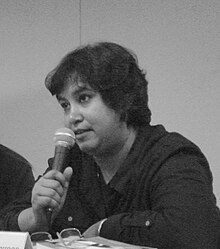Taslima Nasrin
| Taslima Nasrin | |
|---|---|

Taslima Nasrin in 2007
|
|
| Native name | তসলিমা নাসরিন |
| Born |
25 August 1962 Mymensingh, East Pakistan (now Bangladesh) |
| Occupation | Physician, Poet, novelist, columnist. |
| Nationality | Swedish |
| Citizenship | Bangladesh, Sweden |
| Subject | Humanism,secularism, rationalism, feminism. |
| Literary movement | Women's rights, Human rights, secular movements |
| Years active | 1973–present |
| Website | |
| taslimanasrin |
|
Taslima Nasrin (also Taslima Nasreen, born 25 August 1962) is a Bangladeshi author and former physician who has been living in exile since 1994. From a literary profile as a poet in the late 1970s, she rose to global attention by the beginning of 1990s owing to her essays and novels with feminist views and criticism of all "misogynistic" religions including Islam.
After living more than a decade in Europe and the USA, Taslima moved to India in 2005, but she was banished from India in 2008.
She advocates freedom of thought and human rights by publishing, lecturing, and campaigning. She has been unable to return either to her home in Bangladesh or to her adopted home of West Bengal, India .
She received numerous awards for her work.
Nasrin was born to Dr. Rajab Ali and Edul Ara in the town of Mymensingh. Her father was a renowned physician, and a professor of Medical Jurisprudence in Mymensingh Medical College, also at Sir Salimullah Medical College, Dhaka and Dhaka Medical College. Taslima studied medicine and became a physician.
After high school in 1976 (SSC) and higher secondary studies in college (HSC) in 1978, she studied medicine at the Mymensingh Medical College, an affiliated medical college of the University of Dhaka and graduated in 1984 with an MBBS degree; In college, she demonstrated her propensity for poetry by writing and editing a poetry journal called Shenjuti. After graduation, she worked at a family planning clinic in Mymensingh for a while, then practised at the gynecology department of Mitford hospital and at the anesthesia department of Dhaka Medical College hospital. While she studied and practised medicine, she saw girls who had been raped; she also heard women cry out in despair in the delivery room if their baby was a girl. She was born into a Muslim family; however, she became an atheist over time. In course of writing she took a feminist approach
...
Wikipedia
